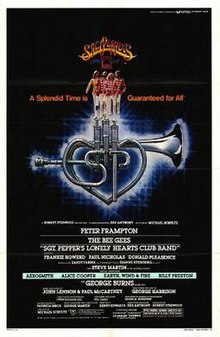| Sgt. Pepper's Lonely Hearts Club Band | |
|---|---|
 Theatrical release poster | |
| Directed by | Michael Schultz |
| Written by | Henry Edwards |
| Based on | Sgt. Pepper's Lonely Hearts Club Band by The Beatles |
| Produced by | Robert Stigwood |
| Starring | |
| Narrated by | George Burns |
| Cinematography | Owen Roizman |
| Edited by | Christopher Holmes |
| Music by | |
Production company | |
| Distributed by | Universal Pictures (United States) Paramount Pictures (through Cinema International Corporation; international) |
Release date |
|
Running time | 111 minutes[1] |
| Country | United States |
| Language | English |
| Budget | $13 million[2] |
| Box office | $20.4 million[3] |
Sgt. Pepper's Lonely Hearts Club Band is a 1978 American jukebox musical comedy film directed by Michael Schultz, written by Henry Edwards and starring an ensemble cast led by Peter Frampton and the Bee Gees. Depicting the loosely constructed story of a band as they wrangle with the music industry and battle evil forces bent on stealing their instruments and corrupting their hometown of Heartland, the film is presented in a form similar to that of a rock opera, with the songs providing "dialogue" to carry the story. George Burns has most of the spoken lines that act to clarify the plot and provide further narration but there are a few other lines throughout the movie (such as many robots).
The film's soundtrack, released as an accompanying double album, features new versions of songs originally written and performed by the Beatles. The film draws primarily from two of the band's albums, 1967's Sgt. Pepper's Lonely Hearts Club Band and 1969's Abbey Road. The film covers all of the songs from the Sgt. Pepper album with the exceptions of "Within You, Without You" and "Lovely Rita", and also includes nearly all of Abbey Road.
The production was loosely adapted from Sgt. Pepper's Lonely Hearts Club Band on the Road, a 1974 off-Broadway production[4] directed by Tom O'Horgan.[5] The film was met with minor box office success, grossing $20.4 million against a budget of $13 million, but overwhelmingly negative reviews from critics. However, a few renditions of some songs, particularly Earth, Wind & Fire's cover of "Got to Get You Into My Life" and Aerosmith's cover of "Come Together", were met with high praise, the former earning Earth, Wind & Fire a Grammy, and the latter being a top-25 hit single.
- ^ "Sgt. Pepper's Lonely Hearts Club Band (U)". British Board of Film Classification. August 24, 1978. Retrieved August 16, 2015.
- ^ Lee, Grant (July 23, 1978). "'Sgt. Pepper': Marching to Schultz's Beat: 'Sgt. Pepper' and Schultz Come Together". Los Angeles Times. p. v23.
- ^ "Sgt. Pepper's Lonely Hearts Club Band". boxofficemojo.com. Retrieved December 29, 2020.
- ^ "The Theater: Contagious Vulgarity". Time. December 2, 1974. Archived from the original on December 22, 2008. Retrieved May 23, 2010.
- ^ According to IMDb, one of the credits for the film is "Stage production conceived and adapted by Tom O'Horgan."